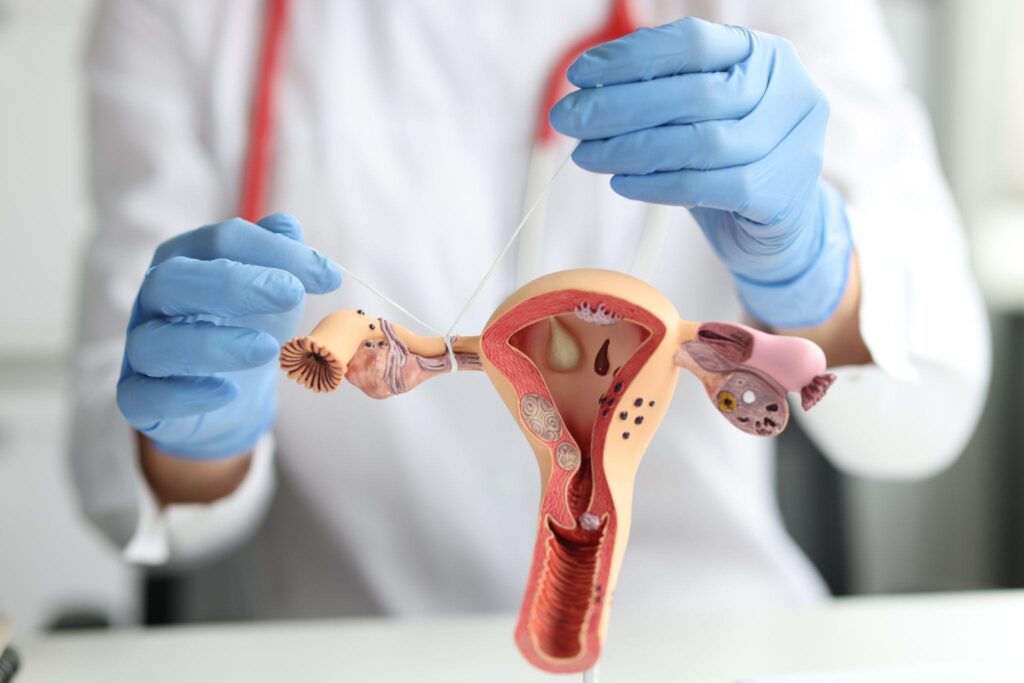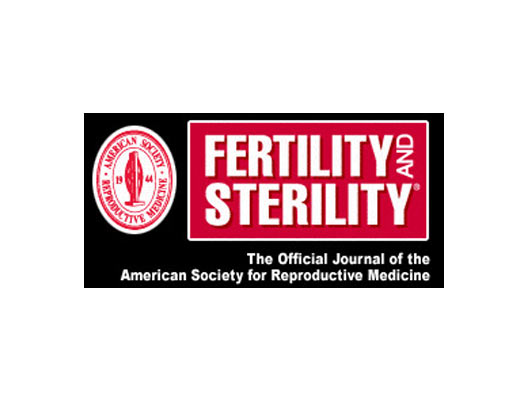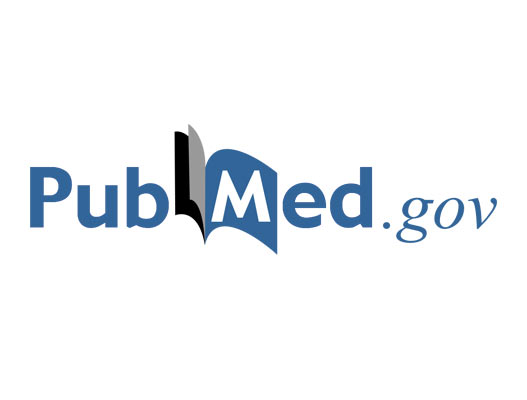Blocked fallopian tubes are a common cause of female infertility, preventing the egg from traveling down the tube to meet the sperm and be fertilized. Various factors and conditions can lead to this issue:
Pelvic Inflammatory Disease
Pelvic Inflammatory Disease (PID): This infection of the reproductive organs can cause scarring or damage to the fallopian tubes.
Inflammatory Pelvic Disorder and Its Impact on Fallopian Tubes
Inflammatory Pelvic Disorder (PID) is a serious infection of the female reproductive organs, including the uterus, fallopian tubes, and ovaries. It’s often caused by sexually transmitted infections (STIs), such as chlamydia or gonorrhea, that ascend from the vagina or cervix into the reproductive organs. PID can lead to severe and lasting consequences for reproductive health, one of the most significant being the blocking of the fallopian tubes.
The inflammation caused by PID can result in scar tissue, known as adhesions, forming on the fallopian tubes. This scar tissue can block the tubes, preventing the egg and sperm from meeting, which can lead to infertility. In some cases, PID may cause the tubes to become partially or completely blocked, significantly reducing the likelihood of natural conception. Additionally, women with a history of PID are at increased risk of experiencing ectopic pregnancies, where a fertilized egg implants outside the uterus, often in the fallopian tubes, due to the blockage preventing the egg from reaching its proper location in the uterus.
Early diagnosis and treatment of PID are crucial to prevent the development of scar tissue and maintain fertility. Antibiotics are typically used to treat the infection, but in cases where significant scarring has occurred, surgery may be recommended to remove the blockage or fallopian tubes. Clear Passage is just as effective as surgery at unblocking fallopian tubes and is all natural (no surgery and no medication).

In the LEFT IMAGE (Before Therapy), dye enters the white area showing the inner walls of the uterus but cannot exit (shown in red circles); these tubes are totally blocked.
In the RIGHT IMAGE (After Therapy) dye fills the uterus, then exhibits ‘free spillage’ as it pours out of both fallopian tubes (shown in green circles); these tubes are wide open, capable of pregnancy.
Endometriosis
Endometriosis: A condition where tissue similar to the lining inside the uterus grows outside it, potentially blocking the fallopian tubes.
Endometriosis Stages and Effects on Fallopian Tubes
Endometriosis is a condition where tissue similar to the lining of the uterus grows outside the uterus, causing pain and potentially leading to infertility. The severity of endometriosis is classified into four stages: minimal (I), mild (II), moderate (III), and severe (IV), based on the location, amount, depth, and size of the endometrial tissue growth. These stages help in understanding the progression of the disease and its impact on the reproductive organs, including the fallopian tubes.
In the context of fallopian tubes, endometriosis can lead to blockages in several ways, especially in moderate to severe stages. Endometrial tissue can grow on or near the fallopian tubes, causing inflammation and scar tissue formation (adhesions). These adhesions can then block the pathway of the egg through the fallopian tubes, hindering fertilization and pregnancy. In severe cases, endometrial growths can cause the tubes to become distorted or can lead to the formation of cysts (endometriomas) that exert pressure on the tubes, further contributing to blockages. This obstruction not only affects fertility but can also increase the risk of ectopic pregnancy, where a fertilized egg implants outside the uterus, often in the fallopian tube itself.
Management and treatment of endometriosis, particularly when aiming to preserve or restore fertility, can include hormonal therapies, pain management, and surgical options to remove endometrial growths and scar tissue. Clear Passage® is a world leader with over three decades of experience in decreasing pain and improving fertility in women with endometriosis, without surgery or medications. Several peer-reviewed studies show our results improve pain and infertility in women with endometriosis.
Previous Surgery
Previous Surgery: Surgeries involving the abdomen or pelvis, including cesarean section, can lead to scar tissue that blocks the tubes.
Impact of Previous Surgeries on Fallopian Tubes
Previous surgical interventions in the abdomen or pelvis can inadvertently affect the fallopian tubes, leading to blockages that impact fertility. Surgeries such as appendectomies, surgeries for ectopic pregnancies, cesarean sections, or any pelvic or abdominal surgery can result in the formation of scar tissue, known as adhesions. These adhesions can develop as the body’s natural response to healing from surgery, but they can cause the fallopian tubes to become blocked or distorted. The risk of blockage increases with the extent of the surgery and the amount of scar tissue formed, which can interfere with the egg’s ability to travel through the fallopian tubes to meet the sperm.
Read “How to Tell if You Have Adhesions After C-Section” for more details on cesarean section scar tissue.
Moreover, surgeries that directly involve the reproductive organs, such as ovarian cyst removal or treatment for endometriosis, carry a higher risk of affecting the fallopian tubes. In some cases, the surgical procedure itself may require the cutting, removal, or manipulation of the fallopian tubes, which can lead to partial or complete blockages. These blockages prevent sperm from reaching the egg or the fertilized egg from moving down to the uterus, thereby affecting fertility. Early and effective post-surgical care, along with minimally invasive surgical techniques, can help minimize the formation of scar tissue and preserve fallopian tube function. If you are diagnosed with blocked fallopian tubes, or hydrosalpinx, due to scar tissue, Clear Passage ® has been shown to open blocked tubes nearly 70% of the time, with many women becoming pregnant after treatment.

“You succeeded in breaking up adhesions that blocked my tubes and in such a short amount of time. The tests confirm this and I was even able to achieve a pregnancy all because of your remarkable work.”
Chandra
Ectopic Pregnancy
Ectopic Pregnancy: A pregnancy that occurs in the fallopian tube rather than in the uterus can damage or block the tubes.
Ectopic Pregnancy and Its Impact on Fallopian Tubes
An ectopic pregnancy, also known as an ectopic gestation, occurs when a fertilized egg implants and grows outside the main cavity of the uterus, most commonly in one of the fallopian tubes. This condition not only poses immediate health risks to the pregnant individual but also has long-term implications for the fallopian tubes and fertility. During an ectopic gestation, the growing embryo can cause the fallopian tube to stretch and possibly rupture, leading to internal bleeding, severe pain, and, in some cases, life-threatening situations that require emergency medical intervention.
The treatment for an ectopic pregnancy often involves medication or surgery, depending on the gestation’s size and location, as well as the individual’s overall health. Surgical treatment may include the removal of the ectopic pregnancy and, if necessary, part or all of the affected fallopian tube. This procedure can result in scar tissue formation within the remaining parts of the tube, potentially leading to a blockage. Such blockages hinder the normal passage of eggs from the ovaries to the uterus, thereby affecting future fertility. In cases where an ectopic pregnancy has occurred, the risk of having another ectopic gestation increases, making it crucial for individuals to be closely monitored in subsequent pregnancies. In cases where an entopic pregnancy has caused an adhesion and narrowed a fallopian tube, Clear Passage® Therapies have been shown as an effective method for opening the blocked tube.
Fibroids
Fibroids: These benign tumors can grow in the uterus and block the fallopian tubes.
Fibroids and Their Role in Fallopian Tube Blockages

Fibroids, or fibroid myomas, are benign tumors that develop within the muscle tissue of the uterus. These growths are among the most common non-cancerous tumors in women of reproductive age and are often associated with fibroid disease, a condition characterized by the presence of one or more fibroids. While fibroids can vary greatly in size, number, and location within the uterus, their impact on a woman’s reproductive system can be significant, particularly when they lead to the blockage of the fallopian tubes.
The mechanism by which fibroids cause fallopian tube blockages involves their physical presence and growth within the uterus. Large fibroids, especially those growing on the outer surface of the uterus or within the uterine wall (intramural fibroids), can exert pressure on the adjacent fallopian tubes, obstructing the passage through which the egg travels from the ovary to the uterus. This obstruction can prevent fertilization or interfere with the embryo’s ability to reach the uterus, leading to fertility issues or an increased risk of ectopic pregnancy. Moreover, fibroid disease can contribute to a distorted uterine cavity or fallopian tubes, further complicating the path of the egg and affecting reproductive outcomes. The treatment for fibroids causing such complications often involves surgical intervention, such as myomectomy, to remove the fibroids and restore normal anatomy, aiming to alleviate the blockage and improve fertility. Although Clear Passage has never done research on fibroids, therapy can help with post-surgical adhesions or subsequent blocked fallopian tubes.
Sexually Transmitted Infections
Sexually Transmitted Infections (STIs): Infections such as chlamydia and gonorrhea can cause inflammation and scarring of the fallopian tubes.
The Link Between STIs and Blocked Fallopian Tubes
Sexually Transmitted Infections (STIs) such as chlamydia, syphilis, and gonorrhea are major public health concerns due to their ability to cause serious reproductive health issues, including blocked fallopian tubes. These infections can lead to Pelvic Inflammatory Disease (PID), a condition that affects the uterus, fallopian tubes, and other parts of the reproductive system. Chlamydia and gonorrhea, in particular, are known for their propensity to ascend from the cervix to the fallopian tubes, where they cause inflammation and scarring. This scarring can lead to blockages in the fallopian tubes, preventing eggs from passing through, which is a common cause of infertility.
Syphilis, while less commonly associated with PID, can also contribute to reproductive health complications if left untreated. The inflammation and immune response triggered by these STIs can damage the delicate lining of the fallopian tubes, impairing their function and leading to the formation of scar tissue. This process not only blocks the path of the egg but also increases the risk of ectopic pregnancies, where a fertilized egg implants outside the uterus, often in the fallopian tube itself. Early detection and treatment of chlamydia, syphilis, and gonorrhea are crucial in preventing PID and its complications, highlighting the importance of regular STI screenings and public health initiatives aimed at reducing the prevalence of these infections. If you have suffered from an STI and now have blocked tubes or unexplained infertility, Clear Passage® Therapies can help you get pregnant.
Diagnosis and Treatment
Diagnosing blocked fallopian tubes typically involves medical imaging tests such as a hysterosalpingogram (HSG). Treatment options vary based on the cause and extent of the blockage and may include surgical procedures to open or remove the blockage or assisted reproductive technologies (ARTs) like in vitro fertilization (IVF). Clear Passage® Physical Therapy is the gold standard of care to open blocked fallopian tubes without surgery.





















